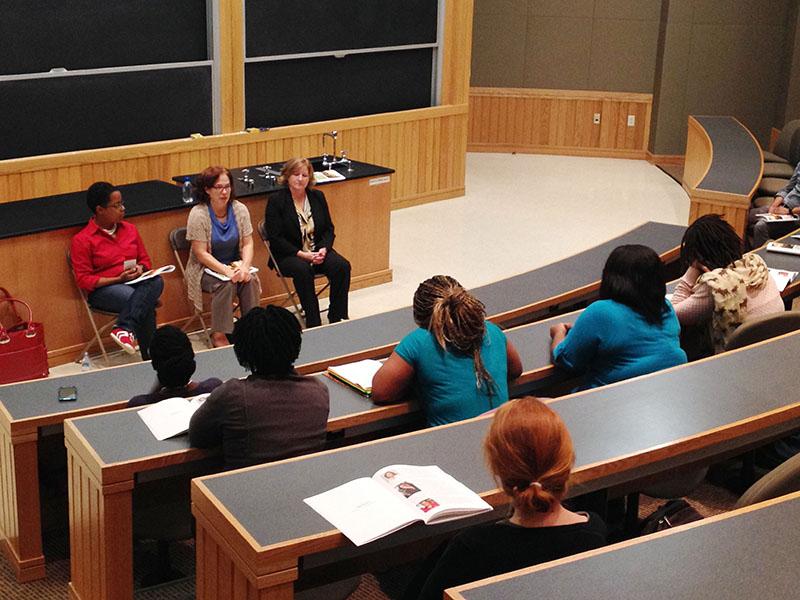Oberlin Honors Undergraduate Research
Students listen to alumni panelists discuss the undergraduate research they conducted at Oberlin. The panel was part of the Celebration for Undergraduate Research, which honored research by natural and social science students.
September 26, 2014
This year’s annual Celebration of Undergraduate Research displayed student research findings from both the natural and social sciences and provided a platform for interdisciplinary discussions. The celebration included an alumni panel, a poster session and oral presentations by student researchers.
According to Afia Ofori-Mensa, visiting assistant professor of Comparative American Studies, Director of the Office of Undergraduate Research and the organizer of the celebration, the goal of the event was to raise the profile of undergraduate research on campus.
“This event has been going on for a number of years,” said Ofori-Mensa. “It’s an opportunity for undergraduates participating in summer fellowships, such as the Mellon Mays Undergraduate Fellowship or the Oberlin College Research Fellowship, to show off their work.”
The celebration began on Thursday, Sept. 25 with a panel of three alumni who conducted undergraduate research during their time at Oberlin. The members of the panel relayed the impact that undergraduate research had on their careers, saying that they hoped to inspire other undergraduates to pursue summer research opportunities.
The alumni panel was followed by a poster session the next day in the Bent Corridor of the Science Center, where students presented their work and discussed their summer research using their posters as visual aids. The program is perennially popular; according to Marcelo Vinces, director of the Center for Learning, Education and Research in the Sciences at Oberlin, there was not enough space for all undergraduate researchers to present due to the programs’ sheer number of applications.
This year’s program is similar in many ways to the 2013 celebration however, the event will now include presentations from the natural sciences, an element absent from last year’s program.
“[I feel it’s] valuable to see the work people are doing in the sciences,” said undergraduate researcher and College senior Aria Dean.
According to Vinces, the summer research opportunities and the celebration promote a cross-talk between different disciplines.
“It’s a rare opportunity to learn about different fields other than the one you’re doing research in,” Vinces said.
Undergraduate researcher and College senior Tiffany Henry described the two fields of study as a binary on “opposite ends of the same spectrum.”
Despite the opportunity to build connections between the social and natural sciences, some social science researchers feel the format of the celebration is not ideal for presenting social science research. Dean, a Studio Art major who began her research on the philosophies of architecture the summer after her sophomore year, said she feels that this type of visual presentation is not an effective approach for displaying her research.
“Posters wouldn’t work for my kind of research,” said Dean. “They work for science research, but a poster doesn’t work for philosophy.” College junior Amethyst Carey, a Sociology major whose research focuses on access to education in relation to race, income and residential stratification, echoed these concerns. “Social science lends itself more to verbal explanation or oral presentations, just because of the subject matter,” said Carey.
Henry, also a Sociology major, examined the beauty and beautification processes of Jamaican immigrants in the United States and how those processes change in the context of American culture. Henry, who focused on how she can analyze and dissect society in a larger global context, shared concerns about the underestimation of social sciences and humanities within the undergraduate research community at Oberlin.
Eboni Johnson, OC ’97 reference and instruction librarian and member of the alumni panel, feels that undergraduate research provides a valuable opportunity.
“It’s really cool that as undergraduates students have an opportunity to contribute to the scholarly conversation,” said Johnson.

























